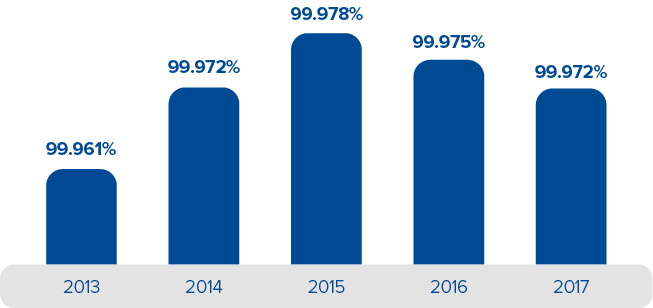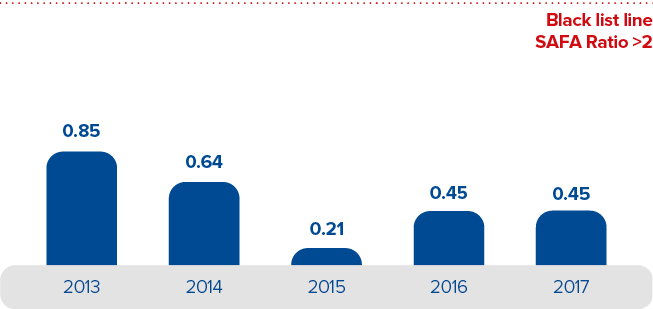Flight Safety and Aviation Security
Flight safety and aviation security are a top priority for Aeroflot Group. Every year the Group improves its integrated management system for flight safety and aviation security developed in compliance with IOSA international standards and the Federal Aviation Rules of the Russian Federation and seeks to ensure the maximum safety and comfort for its passengers.
Flight safety
Aeroflot maintains consistently high flight safety levels which in 2017 stood at 99.972%, exceeding the 99.957% target and staying comfortably within the 99.900%–100% top range..
In 2017, PJSC Aeroflot had a series of inspections and audits that confirmed the high level of flight safety maintained by the Company. Specifically, during a scheduled audit of Aeroflot’s operations for compliance with IOSA (the IATA Operational Safety Audit), IATA auditors found zero non-compliances.
The SAFA ratio calculated based on inspections run under the Safety Assessment of Foreign Aircraft (SAFA) Programme remained flat year-on-year at 0.45 across both Aeroflot airline and Aeroflot Group.
99.972%
Flight safety level
of Aeroflot airline
0.45
The SAFA ratio calculated based on inspections run under the Safety Assessment of Foreign Aircraft Programme
Inspections run by Federal Air Transport Agency and Federal Service for Supervision of Transport (Rostransnadzor) commissions reaffirmed PJSC Aeroflot’s ability to operate safe commercial flights as required by the Federal Aviation Rules. In addition, during 2017, inspections were performed at:
- airport refuelling facilities by the IATA Fuel Quality Pool (IFQP)
- Aeroflot airline’s aircraft in European airports under the SAFA Programme
- Sheremetyevo airport including apron inspections and quality of ground handling and maintenance inspections
- airports within Aeroflot’s airline route network and representative offices of the Company to ensure flight safety.
In 2017, Aeroflot continued to develop its flight safety management system. The Company introduced a flight safety statistics database in 2017 to enable integrated processing and storage of Aeroflot’s fight safety data.
The Safety Management Committee assessed risks across the Company’s core business segments and executed follow-up risk mitigation initiatives. Aeroflot implemented an action plan to prevent bird-strike incidents, consistently conducts training sessions on safe flight operations in electrically active areas, and developed guidelines on manual control during high altitude flights. The Company also makes consistent efforts to mitigate the risk of aircraft ground damage.
The Company has in place a voluntary reporting system for employees with all crew feedback reviewed daily by the Safety Management Department to develop and implement improvements
Aviation and transportation security
PJSC Aeroflot is committed to maintaining a robust aviation and transportation culture and has a strong focus on passenger and staff health and safety, including through liaising with airport security services, airlines, and law enforcement authorities.
In 2017, PJSC Aeroflot once again demonstrated its compliance with the industry standards on aviation and transportation security as ISO 9001:2015 and IOSA compliance audits revealed zero non-compliances.
The Company operates a dedicated Automated Aviation Security Management System (AA SEMS) core modules of which are helping the Company to efficiently assess security risks and prevent financial and reputational damage.
In 2017, the Company was actively involved in improving the Russian aviation and transportation security legislation. Aeroflot’s representatives contributed to discussions at the Russian State Duma Committee for Transport and Construction on draft law No. 49153-6 On Amending the Aviation Code of the Russian Federation to prevent unruly passenger behaviour on board (passenger black lists) and at the Federation Council Temporary Committee on monitoring the implementation of Federal Law No. 15-FZ On Amending Certain Legislative Acts of the Russian Federation on Transport Security, to develop a draft law On Amendments to the Federal Law on Transport Security, and were involved in the Inter-Agency Working Group on Aligning Aviation and Transportation Security Regulations established upon request by Aeroflot.
Aeroflot’s proactive stance on the matter resulted in amendments to the Criminal Code of the Russian Federation increasing penalties for unruly behaviour on transport. Starting from June 2018, Russian carriers will be able to put unruly passengers on black lists and refuse carriage.
Aeroflot is involved in an active dialogue with its SkyTeam partners and attends annual meetings of SkyTeam Aviation Security Functional Experts (ASFE).
Aeroflot also continued to enhance its integrated canine service ensuring security through olfactory monitoring of Sheremetyevo airport facilities.
PJSC Aeroflot works in close partnership with its subsidiaries to ensure aviation security. All subsidiaries submit regular reports to the Aviation Security Management Department on the aviation security status of their facilities, while PJSC Aeroflot conducts centralised risk monitoring and analysis across the Group’s route network. Aeroflot plans to create a shared information space to enhance aviation security management integration across the Group.


